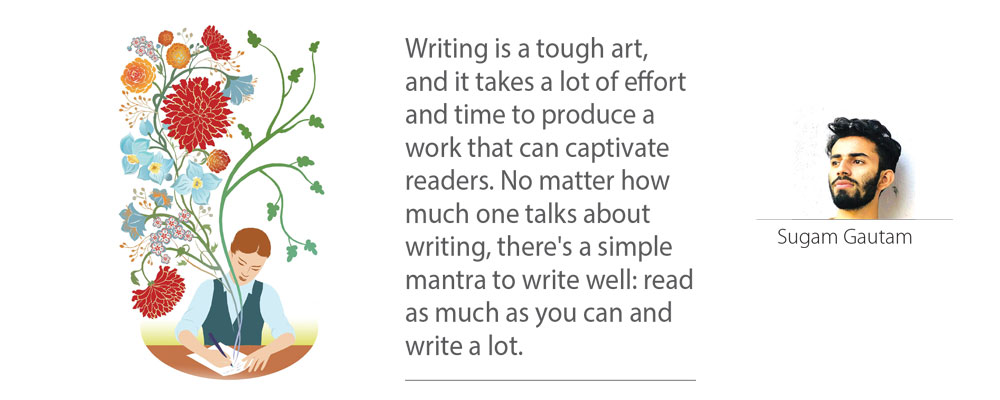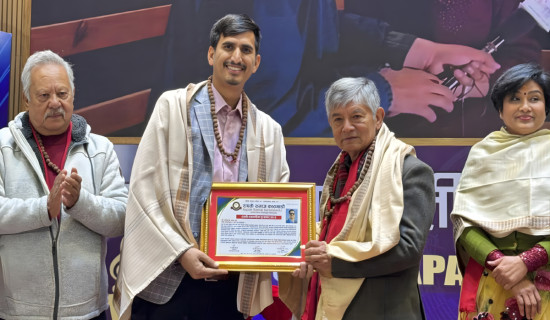- Sunday, 28 December 2025
The Art Of Writing
A few weeks ago, a friend on Facebook messaged and asked me if I could read and comment on his recently written piece. I said yes, and I read his story. After reading the story, I felt he should learn the basics of writing before actually writing a story. The writing was so poor that it took me an hour or so to read just 2000 words. There were issues with grammar, sentence structure, and many other things that I can't remember now. I was stunned because the person who sent me his work holds a Master's degree in English. It's not just him; I've seen many English graduates struggle with the language. It's understandable that non-native English writers don't have a grasp of the language like native English writers do, but it's not excusable when someone holding a Master's degree makes such silly mistakes. It is not to say one must not make mistakes. Errors are inevitable, but they can be minimised.
Read voraciously
When I was a kid, I used to think that writers were geniuses by birth, and they wrote books easily with minimal effort. I was wrong in assuming that. I grew to learn that writing comes from years of devotion, perseverance, and, most of all, practice. The more you practise, the better you get. And before writing, comes reading. If anyone says they don't read much but can write well, I won't be convinced by them. If we look back and observe, we can see that good writers were once good readers. When one reads voraciously, he develops the qualities required to become a writer. Unless you read, you can't identify what is good writing and what is bad. So the first step towards becoming a good writer is to read as much as possible. Only when one spends considerable time around books can he have a knack for playing with words. It's easy to say that one needs to read a lot to become a writer, but in the beginning, one can find it challenging to read for a long time. Surrounding yourself with the genre that you like can help you read more. When a person is surrounded by books he doesn't like, there's a high chance of him not flipping through a single page.
In this tech-savvy era, every field is tied to technology in one way or another. And books are no exception. E-reading has become so common these days, and readers across the world are seen reading on digital screens. Those aspiring to become writers must make use of their digital gadgets by reading whatever they can get their hands on, be it newspaper articles or e-books. Even while travelling, a person must carry books with him if he is to read more.
Master language
Language is the medium through which you express your creative thoughts to the world, so it's not possible to become a writer without having a good command of the language. A sense of language comes from reading, so one must read to develop a good language. It's possible to improve language by reading guide books that teach you the fundamentals of language and writing. In my childhood, I read numerous books that taught me grammar and other basic principles of writing. There are so many books available on the market that can boost your writing if used properly. I have gone through books like "The Elements of Style'' by William Strunk and "On Writing" by Stephen King. I found them so useful, and I think those who are striving to become writers will also like them.
Embrace creativity
When you stop caring about the result, you'll welcome more ideas and creativity. In one of the seminars I've recently attended, an old-looking writer threw a nugget of wisdom: if you want to become a writer, write more and care less about how people perceive your writing. The choice of people is so diverse, and it's not necessary that everyone likes your work. A writer must not presume things from readers' perspectives and must write what intrigues him. I don't even like some books written by my favourite author. What I mean to say is that writing, first of all, must make sense to the writer rather than to the general public.
Overcome rejection
The most common problem among wannabe writers is the fear of rejection. I've come across a handful of young writers who are capable but not optimistic about their writing. They hesitate to submit their writing to online portals and newspapers just because they think it will not get validation from the editorial team. What those young writers must understand is that every famous writer in the world today has faced rejection at some point in their career. Had they kept their writing inside the closet without submitting it, the world wouldn’t have recognised them as renowned writers today. The benefit of submitting your writing, especially to newspapers, is that you can compare your original piece with the published piece. The newspaper editorial team revises it and makes it more readable and jargon-free. By comparing your original writing with the final draft, you learn about your limitations and weaknesses. There will always be more room for improvement if you submit your writing to someone better than you.
Writing is a tough art, and it takes a lot of effort and time to produce a work that can captivate readers. No matter how much one talks about writing, there's a simple mantra to write well: read as much as you can and write a lot. Good writing might not be everyone's cup of tea, but it's achievable if one invests enough will and dedication.
(The author is a writer from Pokhara.)
















